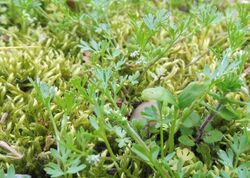Biology:Ammoselinum butleri
| Ammoselinum butleri | |
|---|---|

| |
| Scientific classification | |
| Kingdom: | Plantae |
| Clade: | Tracheophytes |
| Clade: | Angiosperms |
| Clade: | Eudicots |
| Clade: | Asterids |
| Order: | Apiales |
| Family: | Apiaceae |
| Genus: | Ammoselinum |
| Species: | A. butleri
|
| Binomial name | |
| Ammoselinum butleri (Engelm. ex S. Watson) J.M. Coult. & Rose
| |
Ammoselinum butleria, commonly called the Butler's sandparsley,[1] is a species of flowering plant in the carrot family (Apiaceae). It is native to North America, where it is found primarily in the South Central United States.[2] It is most often found in disturbed sandy areas, including lawns.[3][4] Its range has expanded eastward in recent times, leading some authorities[who?] to consider populations east of the Mississippi River to be non-native.[5]
Description
Ammoselinum butleri is small annual, usually reaching no more than 5 cm (2.0 in) high (rarely up to 12 cm (4.7 in)). It has leaves that are decompound, and divided into linear segments. It blooms in the spring, where it produces small umbels of flowers in the axils of stem leaves. In contrast to the similar Ammoselinum popei, the fruits of Ammoselinum butleri are nearly smooth.[4]
References
- ↑ "Ammoselinum butleri". Natural Resources Conservation Service PLANTS Database. USDA. https://plants.usda.gov/core/profile?symbol=AMBU. Retrieved 15 July 2018.
- ↑ "Ammoselinum butleri", County-level distribution map from the North American Plant Atlas (NAPA) (Biota of North America Program (BONAP)), 2014, http://bonap.net/MapGallery/County/Ammoselinum%20butleri.png, retrieved 15 July 2018
- ↑ Yatskievych, George (2006). Flora of Missouri, Volume 2. Missouri Botanical Garden Press. pp. 63.
- ↑ 4.0 4.1 Diggs, George; Lipscomb, Barney; O'Kennon, Robert (1999). Flora of North Central Texas. Botanical Research Institute of Texas. p. 243. http://artemis.austincollege.edu/acad/bio/gdiggs/NCTXpdf.htm.
- ↑ Alan Weakley (2015). "Flora of the Southern and Mid-Atlantic States". http://www.herbarium.unc.edu/flora.htm.
Wikidata ☰ Q15561535 entry
 |

